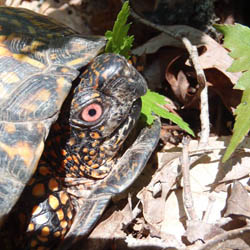WBIW.com News - local
Brought to you by WBIW News and Network Indiana
Keep Wildlife Wild - Turtle Conservation
Last updated on Monday, May 7, 2018
(UNDATED) - Indiana is home to 16 different species of turtles. Due to a combination of habitat loss, water-quality degradation, and collection of turtles for the pet trade, seven of those species are either state endangered or a species of special concern.

There are a number of ways people can help with turtle conservation:
- Check for turtles before mowing and burning activities. Indiana's native turtles venture onto land to lay their eggs, typically from April to June.
- When you see a turtle crossing a roadway, move the turtle across the road in the direction in which it was heading.
- When moving a turtle, be sure to grasp the back of the shell with both hands. Holding turtles by their tails can cause harm. (Remember, turtles can bite and scratch)
- Turtles don't make good pets. They are solitary animals, may be expensive and can carry Salmonella bacteria.
- Any turtle collected from the wild requires either a legal license or permit, and all reptile eggs and endangered species are protected.
Reasons why turtles aren't good pets:
- Turtles require time and money for proper care, and some species can live up to 50 years.
- Pet turtles do not like to be held and are loners; therefore, they can become boring pets for children.
- Turtles are cold-blooded and need a source of heat. They also require an ultraviolet light for proper growth and health.
- Without this special light, many health issues arise such as metabolic bone disease.
- It is very important to know what kind of species you want and the care it needs before you acquire a pet turtle. Many need special food and tanks.
- Each species has different feeding requirements, with some being strictly carnivores or herbivores. Map turtles, for example, have restricted diets that must include snails, aquatic insects and crayfish. Some species of aquatic turtles, such as the red-eared slider, map turtle and soft-shell, grow up to 12 inches long, requiring a large tank for swimming and basking.
- Land turtles need a large pen, with sufficient substrate, properly sized water bowl, a hide area, as well as heat. Some require more humidity than others.
- If you no longer want your pet turtle, you cannot release into the wild because it is not likely to survive.
- It will have to find its own food, deal with the elements and deal with predators.
- These once-captive turtles are also likely to transmit diseases to wild turtle populations.
- Turtles can carry salmonella bacteria.
- The Centers for Disease Control and Prevention recommend that children, pregnant women, and persons with compromised immune systems avoid contact with reptiles to avoid getting Salmonella.
- The DNR does not encourage the keeping of turtles as pets, but does allow it if the turtle species is obtained legally with a hunting or fishing license.
It is illegal to sell wild turtles. Many native, wild-caught turtles are still sold as pets, even though this practice is illegal in Indiana.
The collection of wild turtles has caused many species to become endangered, especially when combined with habitat loss, water pollution and predators. Predators such as raccoons eat a large number of turtle eggs each year, and some species do not even breed until they are several years old, meaning that it can take many years for a population to become established.
You can help protect Indiana's turtles by helping to preserve turtle habitat, especially wetlands, through local conservation organizations or the Indiana Nongame and Endangered Wildlife Program.

Below is a complete listing of Indiana's native species of turtles:
- Eastern common snapping turtle
- Alligator snapping turtle (endangered)
- Smooth softshell turtle
- Spiny softshell turtle
- Eastern mud turtle (endangered)
- Musk turtle
- Midland painted turtle
- Western painted turtle
- Spotted turtle (endangered)
- Blanding's turtle (endangered)
- Map turtle
- False map turtle
- Ouachita map turtle
- Heiroglyphic river cooter (endangered)
- Eastern box turtle (protected)
- Ornate box turtle (endangered)
1340 AM WBIW welcomes comments and suggestions by calling 812.277.1340 during normal business hours or by email at comments@wbiw.com
© Ad-Venture Media, Inc. All Rights Reserved.
Click here to go back to previous page


